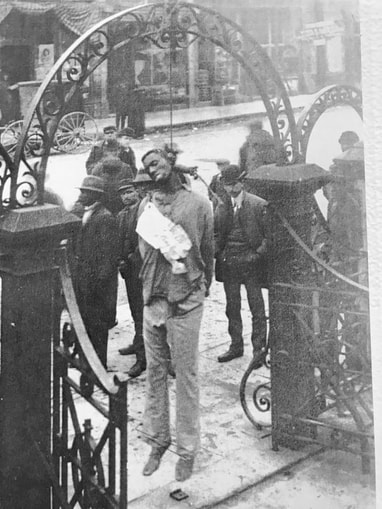 George Carter and the crowd he attracted after his hanging in February 1901. George Carter and the crowd he attracted after his hanging in February 1901. I have been haunted by the case of Ralph Jarl, the Black 16-year-old in Missouri who was shot by Andrew Lester after ringing the elderly white man’s doorbell. Jarl’s mother had asked him to pick up his two younger brothers at a nearby home, but Jarl had mistakenly approached a home on the wrong street. Everything about this situation is shocking. Lester’s behavior is reprehensible and inexcusable, no matter how broadly you interpret Missouri’s Stand Your Ground law. Jarl did nothing more threatening than ring the man’s doorbell. In my youth, someone like Lester might have yelled, “Scram, you punk!” (Well, he might have used a different epithet.) Lester also could have opted to ignore the doorbell and simply not answer the door. But Lester made the choice to shoot the teenager—twice—without exchanging any words. In the criminal complaint, Lester stated that he was “‘scared to death’ due to the male’s size.” This is the detail that caught my attention. Jarl’s family has reported that the youngster is 5’8” and weighs 140 pounds. Lester claimed Jarl was 6 feet tall. There is a considerable discrepancy here between reality and Lester’s perception. I have seen this before. In Tessa Bishop Hoggard’s book In the Courthouse’s Shadow: The Lynching of George Carter, Hoggard relays the story of my great-grandmother’s alleged assault by a Black man while crossing a covered bridge in Paris, Ky., in December 1900. The initial report in the Kentuckian-Citizen newspaper described the incident as an attempted purse snatching. In my great-grandmother’s words, her attacker “had brown skin, weight about 200 pounds, fairly well dressed….” Two months later, a suspect was pulled from his jail cell by a group of local men and lynched in front of the county courthouse. The victim of this extrajudicial justice, George Carter, had never been charged with my great-grandmother’s assault. He was being held in the jail for another offense. But rumors had led to suspicions that he was the guilty man, and the crime against my great-grandmother had also morphed in the prurient imaginations of concerned citizens. But, as you can see from the photo, George Carter clearly was not 200 pounds. In their rush to defend my great-grandmother’s honor, did the mob hang a man who had nothing to do with the incident on the bridge? Or was the description my great-grandmother gave the newspaper at the time of the attack yet another example of white victims reporting Black perpetrators as much larger and more physically threatening than they actually are? In her book, Hoggard also relays the story of another mob lynching in Paris in 1889, where the victim had again been described by the woman he allegedly attacked as “a large, burly Negro, weighing over 200 pounds.” We have no photograph of Jim Kelly to confirm his physical size, but the common language feels suspicious, like a trope that was cemented in the minds of a fearful white population. According to the Washington Post: “In multiple studies, people who were asked to judge the size of Black people tended to see Black men as bigger and stronger than they actually were, and gave Black children the attributes of adults. The result is that they are seen as more dangerous....In some studies, [Kurt Hugenberg, a professor in psychological and brain sciences at Indiana University] showed participants images of Black men and White men who are about the same height and weight. Participants often thought the Black men appeared larger...” Yes, Virginia, there is systemic racism. It permeates so many aspects of our lives and our interactions that even those of us who try valiantly to reject racist tropes inevitably fall under their sway. Racism is pernicious, it’s prevalent, and it’s dangerous. If we refuse to recognize that, we can’t even begin to chip away at the corrosion it has caused. And our fellow citizens will continue to pay the price.
4 Comments
 Photo by Lucas Ludwig on Unsplash. Photo by Lucas Ludwig on Unsplash. Joe Ford, of Louisville, Ky., was inspired by Cathy Eads’ Drag-on to recount more reasons why we must not hide under a bushel. If you would like to submit a post to Clearing the Fog, please contact us here. I knew if I just waited a week or so to respond I would have more fodder, because there is no limit to the pettiness, ignorance, and cruelty of most Republican officials, who hate America and God’s creation so deeply and with such passion. Let’s start with a first graders’ spring concert in Wisconsin. What could be cuter, right? Here’s something cuter: first graders singing “Rainbowland” (by Dolly and her goddaughter Miley) about a utopian world that could be possible if people lived in harmony. It almost makes me tear up just thinking about first graders singing “Chase dreams forever/I know there’s gonna be a greener land/ We are rainbows, me and you/Every color every hue.” But put that hanky away: administrators decided to ban the song, as it is perceived as “controversial” and might not be “appropriate for the age and maturity level of the students.” WTF? What could possibly be MORE appropriate for first graders? A re-enactment of Sandy Hook? The maturity level of the children is not the issue, but rather the maturity level of the adults. I’ll add that “Rainbow Connection” (by Kermit the frog) was apparently also banned from the first graders’ spring concert, but was reinstated, no doubt because the administrators feared they would be ridiculed for the buffoons they are. Really? Rainbows are the issue? Perhaps we should be reminded that rainbows are a sign of the “everlasting covenant between God and all living creatures of every kind on the earth” (Genesis 9:11–15). Moving on, but not really. I roughly quote below from an article by Charles Blow of the New York Times (emphasis mine): An elementary school in St. Petersburg, Florida, stopped showing a 1998 Disney movie about Ruby Bridges, the 6-year-old Black girl who integrated a public elementary school in New Orleans in 1960, because of a complaint lodged by a single parent who said she feared the film might teach children that white people hate Black people. (What? White people hate Black people?) Ruby, a first grader, had to endure throngs of white racists – adults! – jeering, hurling epithets, spitting at her, and threatening her life. But now a Florida parent worries that it’s too much for second graders to hear, see, and learn about in a considerably toned-down Disney movie. But of course, the point is not the protection of children but the deceiving of them. And the real point is that a single parent can object to a lesson or book and potentially have it banned. They are foot soldiers in the culture wars. A Toni Morrison book was banned for a rape scene. The Bible has rape scenes. Are we going to ban that? And moving not very far at all, a principal in Florida (of course) this month was pressured to resign after sixth-graders in his school were shown Michelangelo’s statue of David, a biblical figure no less, and three parents complained. Meanwhile, take no comfort in the promised administrators’ “review process” of these parental complaints, such has been enshrined in law here in Kentucky. There will be no funding for resources to review the hundreds of objections.
So while one individual can squash a book or lesson on the front lines, Republican legislators are establishing an infrastructure to dismantle the American system of government. In Wisconsin, hot on the heels of a win by a liberal-leaning judge who will take a seat on the Wisconsin Supreme Court, a new two-thirds Republican majority in the state’s Assembly is talking about its ability to remove that judge—or the governor or anyone else not to their liking. They likely won’t succeed, but it is the attitude, drunk with power, that is scary. In the wake of the success of abortion protections on ballots across the country, states are rewriting the rules to prevent mere citizens from placing such measures on the ballot. Conservative state houses are stripping Democratic governors of their powers. And duly elected state legislators are being expelled from their offices. In Tennessee this week, three legislators stood in front of the chamber and joined the chants of citizens in the gallery who were protesting the Republicans’ inaction after the recent slaughter of three nine-year-old students and three of their school’s staff members—in the very city where the state house stands—by a former student wielding three guns. For this transgression against decorum, the Tennessee House expelled the two young Black legislators—but NOT the white legislator who also joined the protest. That’s right: The Republican legislators took immediate punitive action toward those peaceably protesting the slaughter of innocents but did nothing about gun violence. Oh wait—they did do something: After the murders, members of the legislature who brought up the topic of gun violence…had their microphones shut off! Hence the protesting legislators’ need for a bullhorn to duly represent the will of their constituents. With the two expulsions, 140,000 citizens of Tennessee lost their representation in the Tennessee House. Did I already say that “Republican legislators are establishing an infrastructure to dismantle the American system of government?” You can’t make this stuff up. Wait another week and we’ll have more examples. The destruction of a free America is upon us. Our new national religion—hate—is here. Write (lots of) letters to the editor. Show up at a Trans rally. Speak the truth, loudly. It is a frustrating time. Many have pointed out that assault weapon owners, hypersensitive and maliciously aggressive school critics, historical revisionists, and election deniers and their ilk are in the minority. But they are loud and well-organized, and they vote. In 2019, for the first time ever, I volunteered to go door-to-door encouraging people to vote for Democratic Kentucky Gov. Andy Beshear. (He won because of me!) The lesson we should take from this is that we, too, have to be loud, have to participate, and have to vote. Hang on to hope. Keep an eye on that rainbow.  Cathy Eads, of Atlanta, asks some charmingly obvious questions. If you would like to submit a post to Clearing the Fog, please contact us here. Dragons pepper the stories of literature with the flavor of excitement, adventure, and terror. They provide a threatening menace for St. George to slay, prey for the chivalrous knights to hunt, and a dramatic theme in many a tale across ancient and modern times. Despite the detailed physical descriptions of their fiery breath and reptilian bodies, dragons are fictitious creations of our collective imagination. Most of us enjoy suspending our disbelief to indulge in the fun of reading about and watching the illusions of these mythical creatures. Make believe and pretend play are innocent and universally human endeavors. Remember who you pretended to be as a kid? A superhero? A cop or robber? A ghoul or villain? An astronaut or a star athlete? A character from your favorite book or movie? A princess, or maybe even a queen? Did you ever dress up and enjoy the fun of acting the part of your alter ego—especially if it showed off the polar opposite of your “normal” self? Ever feel a little extra confidence temporarily just because you were emboldened by playing the part? On Halloween, did dressing up make the candy haul a somewhat secondary reward to the compliments you earned for your awesome costume? Was anyone harmed by your dress-up acting? Did it threaten anyone’s identity? Did anyone suddenly change their mind about who they were on “regular days” because they witnessed you in costume? Did your pretending bring anyone joy? Did it make anyone laugh or smile, give a thumbs up or a high five? Did it entertain others? Did your pretending to be a fictitious character change who you were deep down inside—or open you up to feel more fully yourself, allowing your creativity to shine? Did it make you feel happy? Whenever a powerful group of people tries to extinguish an expression of other people’s freedom, joy, creativity, or shared happiness, THAT is no fictitious beast. THAT is a terrifyingly real and legitimately dangerous creation of human ignorance. To everyone who believes pretend, dress up, and make believe are one part of the human pursuit of happiness, I say DRAG-on, my friends, DRAG-ON! I wholeheartedly defend your right to do so and delight in the glittering sparks of joy it brings to this troubled world. 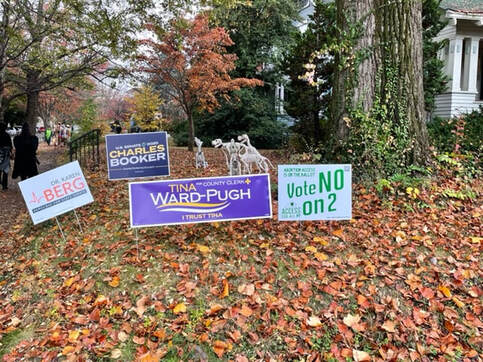 Yard signs in Louisville, Ky., October 31, 2022. Photo by Joe Ford. Yard signs in Louisville, Ky., October 31, 2022. Photo by Joe Ford. Joe Ford, of Louisville, Ky., offers some suggestions for the upcoming election. If you would like to submit a post to Clearing the Fog, please contact us here. If you live in Kentucky, it’s time for our second spring—time to let your lawn sprout political signs! If you’re unsure about what varieties to cultivate, here are a couple of ideas: U.S. SenatorCharles Booker is a native Kentucky species, supportive of diversity and other species in our yards, well-adapted to our growing zone, enhancing the soil to support healthy growth of all plants, and displaying something of interest in all seasons. Rand Paul is an invasive species destructive to our lawns and crowding out our wide variety of native plants, which have little natural resistance to his bullying tactics that spread out-of-control suckers all over the property, threatening indigenous vegetation. Choice: Charles Booker. Amendment 2Yes is a noxious and poisonous cultivar, aggressive and mean. It is a variety bred by dogmatic politicians (mostly male) in Frankfort and Washington whose goal is to dominate smaller, weaker plants and weed out any that don’t reproduce exactly as they think they should. No recognizes the place each plant has in a diverse environment and its need for support and care during all seasons. With the help of a concerned gardener, each plant will thrive in its own space, in its own time. Choice: No Those are the two hot topics around here. Perhaps you have an opinion on your local plantings.
But seriously, put some signs out. Especially for those living out in the state, a sign or two may allow others to think, “Gee, someone else supports the positions I do. I am not awash in a sea of hopelessness and small thinking.” Do vote. 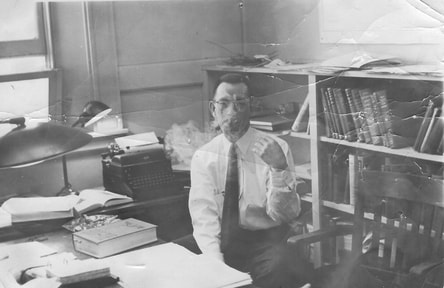 Professor John Campbell "Pud" Goodlett, my dad. Professor John Campbell "Pud" Goodlett, my dad. My father was a professor. My sister was a professor. My cousins were professors. So when J. D. Vance—possibly the most hated “man of letters” in the Commonwealth of Kentucky and Ohio’s current Republican nominee for U.S. Senate—dusted off the old Nixon trope “The professors are the enemy,” I was pert near required to take offense. Not that that was the most offensive thing that Vance has spewed during his gold star campaign of shame. That prize has to go to his declaration that women should stay in violent marriages for the sake of their children, comments he made in front of a California high school audience last year. But back to the diatribe against professors, who, I’ll just add, might also be women trying to survive abusive marriages. Vance, as most of you know, benefited from the instruction of professors at two of our nation’s most esteemed institutes of higher learning: Yale College of Law and The Ohio State University. His adopting Nixon’s old cry is disingenuous at best, dangerous and targeted at worst. Like so many of the most vocal haters and bigots on the populist right—Ted Cruz, Ron DeSantis, Josh Hawley, Donald Trump—Vance has an Ivy League pedigree. I hope his caustic comments about the teachers he studied under will prevent those who agree with him from taking up valuable space in our post-secondary classrooms. All of this pernicious rhetoric is part of a much more dastardly Republican plan to destroy public education and make empty-headed voters more susceptible to their lies and propaganda. And it’s working. Teachers are leaving their chosen profession in droves and fewer and fewer students are stepping up to fill the pipeline. States are drafting military veterans and current college students to stand in front of classrooms full of impressionable youngsters. State legislators are siphoning money away from public schools to fund charter schools that aren’t beholden to state education policies. The U.S. Supreme Court ruled that school vouchers in Maine can be used to offset tuition for religious schools. What public school teachers can say in the classroom is being prescribed by state legislators and angry school board members. Books are being banned, library shelves emptied. Our democracy is under attack. Our schools are under siege. Our nation is breaking apart. And, still, J. D. Vance, in an effort to garner votes from Ohio’s electorate, stands on stage and excoriates the very teachers who gave him the confidence to pull himself up by his own bootstraps and escape the suffocating desperation of his family. Does he not realize that Ohio, with 195 degree-granting postsecondary institutions, may well have one of the highest professors per capita among U. S. states? And that all of those professors have extended family who vote? Perhaps he sought political advice from Kentucky’s one-term governor Matt Bevin, who antagonized teachers across the commonwealth with his persistent attacks on their integrity. Bevin attended Washington and Lee University, where he became fluent in Japanese and majored in East Asian Studies, solid preparation for leading a state where Toyota and its Japanese satellite companies changed the state’s economic trajectory. Like Vance, he clearly benefited from his professors’ tutelage. Vance may well win this election, although I’ll put my money on Democrat and current U.S. Congressman Tim Ryan. Maybe if Vance had paid more attention to his professors, he could run on facts rather than be enslaved to his party’s propaganda and lies.  It’s our nation’s Independence Day, and yet, like many, I feel no desire to celebrate. After the week that was, I’m not sure I recognize our country. Rights and protections we thought were secure, if precedent held, have been obliterated. Pregnant women and medical staff in some states worry they may be prosecuted. Gun safety laws in place for 100 years vanished overnight. The clear line separating church and state evaporated. And the EPA no longer has the authority to regulate businesses that willfully pollute our air and water for profit. This same week we learned that the President of the United States belligerently demanded to be taken to the Capitol during a violent assault on our nation’s governing body so he could confront his mortal enemy, his hand-picked Vice President. What country is this? It’s not one I want to celebrate. Two friends commented recently that they see hope in our youngest adults. Perhaps I need to find some Gen Z friends. I realized this weekend that I have no confidence that the direction this country is headed can be altered in my lifetime. The shift away from democracy toward one-party minority rule seems inexorable. I’ve never wanted to live a particularly long life. I don’t want to be the last of my friends and family left on this earth. But it may take the years required for me to reach 100 before this country can heal. Assuming there is still a planet able to support us. If you were looking here today for a sunny holiday post, I apologize. This weekend I spent time outdoors actively searching for a brighter outlook. On Sunday I found a beautiful Kentucky summer day—moderate temperatures, mild humidity, a bright blue sky, and a fresh breeze—but I did not find hope. 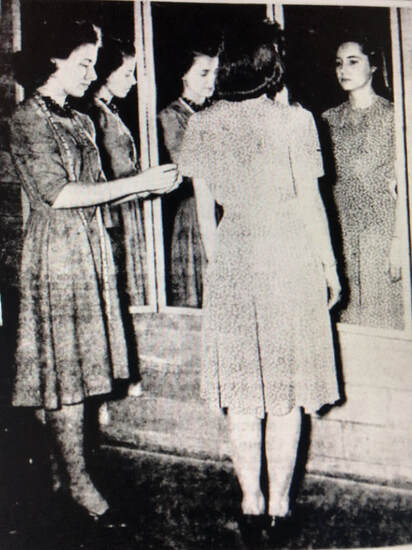 My mother, Mary Marrs Board, on the right, when she was a University of Kentucky student. In the photo, which appeared in the Lexington Leader on November 21, 1940, she is serving as a model for an award-winning “silk print afternoon dress” designed by the student on the left. My mother, Mary Marrs Board, on the right, when she was a University of Kentucky student. In the photo, which appeared in the Lexington Leader on November 21, 1940, she is serving as a model for an award-winning “silk print afternoon dress” designed by the student on the left. I’m not thinking about young girls who will grow up without the protections of Roe. I’m not thinking about the students or the young married women who have lost the choices they had yesterday about their futures and their families. I’m thinking about my mother. My mother, who entered college in 1939 without the assurances I had in 1977. My mother, who so desperately wanted children that she took prescribed poison to protect her pregnancies. My mother, who made sure I understood the choices women had before legal abortion. I can see the two of us sitting in our den in the lower level of our Lawrenceburg home, dim sunlight coming through the dirty glass of the sliding doors that opened to the broad yard. I was sitting on the stone hearth of the fireplace. She was across from me on the sofa. She told me what frantic women had done before. She was matter-of-fact. I was horrified. Incensed. And here we are again, fifty years later. I wonder how my mother would react to today’s news. Would she be as irate as I am about the cruelty of this decision? Would she be more sanguine, having seen more of life, and politics, than I have? Or would she simply be numb? Losing this one “right” may seem small potatoes compared to the looming threat of losing our democracy. How many women and families are really affected? In recent years, fewer than a million women in the U.S. made that choice—fewer than the number of Americans who have died of Covid. And we’ve mostly brushed aside that trauma. I suppose we’ll forget about this, too, in a few short weeks as we make the most of the waning days of summer. But I urge you to be vigilant as the tectonic plates shift ominously beneath us. Exercise the rights you still have. Send a clear message to our self-serving elected representatives. We are the majority. We gave them their power. That is what we can take away. 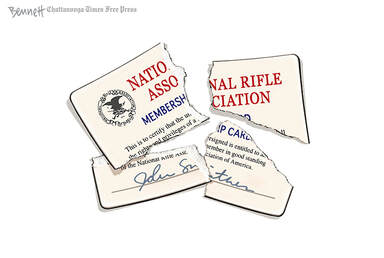 With permission of Clay Bennett, editorial cartoonist, Chattanooga Times Free Press, May 24, 2022. With permission of Clay Bennett, editorial cartoonist, Chattanooga Times Free Press, May 24, 2022. I must have been 10 or 11 years old, the same age as many of the victims of the Robb Elementary School shooting. I remember being herded with my classmates into the combination gymnasium/cafeteria at Saffell Street Elementary in Small Town, Ky. Metal folding chairs were set up in long rows in front of the elevated stage. There might have been some jostling or some goofing around, but students were largely respectful and well-mannered in that era. We took our seats and waited to see what was next. A man appeared on the stage and walked us through a presentation about safely handling guns. I had never held a gun or seen anyone else handle a gun. Nonetheless, I remember paying careful attention, because I evidently knew there would be a test at the end. And I always wanted to do well on every test. I learned the importance of keeping all guns and ammunition locked away when not in use. I learned how to carry a gun safely if I were ever hunting with others. What I remember most, perhaps because it concocted an image of traipsing across fields and farmland and crawling over obstacles—something I loved to do—were the detailed instructions on the importance of unloading a gun before climbing over a fence, handing the empty gun to someone on the other side (or, I suppose, shoving it under the fence), and then climbing over the fence unencumbered before retrieving the gun and reloading it, if necessary. The presenter represented the NRA. He was there to ensure that children living in a rural area where there were certainly many guns available knew about basic gun safety. His job was to keep us safe, to preserve our lives. This was the role of the NRA in 1970. Heather Cox Richardson, in her Letters from an American post on May 26, 2022, reminded me of that. She wrote, “By the 1980s, the National Rifle Association had abandoned its traditional stance promoting gun safety and was defending ‘gun rights.’” Today, the NRA opened its annual convention in Houston, despite the recent slaughter in Uvalde, Texas, five hours due west. The organization has a very different purpose and different goals than it did 50 years ago. Its lobbying efforts have clearly led to the proliferation of guns in American society, where there are more guns than people. Their efforts have also convinced legislators to refuse to back even the most moderate, and widely supported, gun legislation. This week, after the senseless murders at Robb Elementary, Republican office holders have proposed arming teachers and eliminating doors in school buildings rather than raising the age for lawful purchase of a military-style weapon or expanding background checks. Because of the work of the modern NRA, more children will die in mass shootings. As I’ve watched the transformation of the NRA over recent decades, I have frequently recalled the hour or so I spent as a youngster learning about guns. I have to smile at my earnest interest in a lesson that now makes me cringe. Contrasting that innocent hour to the hour of terror endured by the few surviving 10-year-olds in that Robb Elementary classroom spotlights where the NRA has taken this country. I suppose I did OK on the test. I imagine we all were rewarded with the same wallet-size card indicating we had successfully completed a course on gun safety. I was immensely proud of that card and kept it in my billfold for many years. I probably still have it somewhere. I’ve still never held a gun in my hands. I never intend to. I hope I never need to. (As I type that, I am reminded of numerous Ukrainians who have reported they shared my aversion to guns before they felt compelled to learn how to use one.) And the NRA better know that my abhorrence of weapons of mass killing will propel me to the polls every time I have the opportunity to vote against an NRA-endorsed candidate. We cannot let them get away with killing our babies. 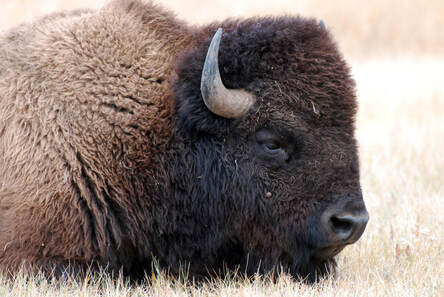 I’ve resisted writing about the mass shooting in Buffalo, N.Y., all week. I seriously doubted that you wanted to hear me rail again about white people slaughtering innocent Black people. But then President Biden reminded us all that “Silence is complicity…. This is work that requires all of us—presidents and politicians, commentators, citizens. None of us can stay on the sidelines.” Well, I’m a citizen. And there are a few people who read what I write. I imagine you all agree with me on this truly black and white issue, or you wouldn’t keep reading. So as much as I wanted to leave this one alone and try to go on with my life, knocking off chores on my long to-do list, I finally had to stop and say something, however banal and however repetitive. First it was Rev. Al Sharpton’s words on “Deadline: White House” with Nicolle Wallace. He said, and I’m paraphrasing here, “We can’t stand around while we’re being livestream lynched.” (Those last two words are a direct quote.) The “we” in his emphatic statement I assume to be African Americans. His dragging the term “lynched” out of our nation’s dusty history and into the 21st century with the modifier “livestream” sent a chill up my spine. That, of course, is exactly what the shooter did. White Americans may be too busy right now going to graduations and attending children’s soccer games and planning sunny vacations to pack a picnic basket and sit on a hillside for hours anticipating a live lynching, as many of our forebears did. But those in our midst so inclined certainly could muster a few seconds to watch a murderous rampage inside a neighborhood grocery store that took the lives of 10 innocents, including an 86-year-old, who was clearly a threat to that white 18-year-old’s opportunities in the good ol’ U.S.A. Then I reread Eugene Robinson’s column from the Washington Post, which started: “Do not dare look away from the bloody horror that left 10 dead in Buffalo. Do not dare write off the shooter as somehow uniquely ‘troubled.’ Those Black victims were murdered by white supremacy, which grows today in fertile soil nourished not just by fringe-dwelling racists but by politicians and other opportunists who call themselves mainstream.” Over the last seven years, many have looked the other way as those embracing white supremacy have been emboldened by powerful voices and by the sometimes covert, sometimes overt, complicity of an entire political party drunk on the promise of power. There are no boundaries. There is no shame. The only human life of value is that of the unborn. And as soon as that infant has hurled its first cry, it can be sacrificed at the altar of mammon if doing so would garner one more vote, one more donation, one more sound bite, one more ego-burnishing story to tell the guys down at the local watering hole. The Buffalo Massacre. As I typed those words, I thought of the glorious bison who roamed huge swaths of our nation before being slaughtered indiscriminately, largely by the greedy White Man. I couldn’t help but acknowledge the parallels. I have to think that most modern Americans regret that bloodshed. Will we ever muster the fortitude to end the senseless slaughter of our fellow Americans? Or will we look away, despite Eugene Robinson’s entreaty, and allow a tiny minority to continue a reign of terror across this great land? Cathy Eads, of Atlanta, felt compelled to write about Justice Samuel Alito’s preliminary opinion overturning Roe v. Wade that circulated earlier this week. If you would like to submit a post to Clearing the Fog, please contact us here. “And the little screaming fact that sounds through all history: repression works only to strengthen and knit the repressed.” ― John Steinbeck, The Grapes of Wrath I have other things to do. I’m trying to sell a house, complete a career training course, parent a young adult child who needs more attention right now, finalize a divorce that’s dragging on longer than expected, work out, and just get around to cleaning my toilets. I’d like to be free to exercise my right to the pursuit of happiness, but as I write this, tears sting my eyes and I’m putting all those things on the shelf to write about the latest attempt to repress freedom in the United States.
It is surreal to consider that what has been a right of women in the USA since I was a chubby-faced little toddler is now at risk of being ripped away. I am experiencing feelings of fury, sadness, broken heartedness, and a fiery motivation to rage against the machine, again. And so, I write, because exercising my voice is one way I can contribute to the defense of my and my sisters’, my daughter’s, my cousins’, my nieces’, my friends’, and all girls’ and women’s rights to reproductive health care. I’ll also march, protest, knock doors, and drive people who need rides to vote, to get health care, or to join me in marching and protesting. Because you, you who are trying to erase us and have power over us, our bodies, and our rights, you will not win. You will not win this battle. You do not own the majority of the U.S. population. We are still free. We see what you are trying to do. When you try to scare us into submission, it emboldens us. We will work persistently to maintain our freedoms, and to gain more equity and more of the power that is absolutely our right to have and to hold. We will not sit down and be quiet. Freedom does not belong only to the white males (and females) who wish to have power over the people in this country at all costs—the ones who are so afraid of sharing the world, sharing power with females, people of color, and people of various religious backgrounds and sexual orientations. Freedom and autonomy over our lives, our bodies, where we live, and who we love are inalienable rights. We know this, and you do, too. We see that it is you who are scared. People who are afraid and feel weak try to gaslight, manipulate, trick, and control others. We don’t want to take your power; we simply want to share the power. This is not a zero-sum game. When we all share in the power and privilege, we can work cooperatively to bring broader access to healthcare, greater wealth, better education, a more secure planet, a more peaceful existence for all people—because that’s what we want. Leaving us out, trying to silence us, attempting to take away our rights means that fewer of the brilliant, creative ideas available to solve our shared problems are being brought to the table. We want a safer more secure life for everyone—even you who are trying to intimidate us. And believe it or not, as ragingly mad as we are at you for the idiot moves you’ve made to squash us into boxes and pretend that we don’t matter, most of us would forgive you and choose to cooperate with you to bring about a better life for us all. Because in truth, we are all part of the human race, just like you, wanting to make the most of the precious time we have here on this planet. Which is why I probably won’t bother cleaning those toilets today either. |
Details
Archives
June 2023
Categories
All
|

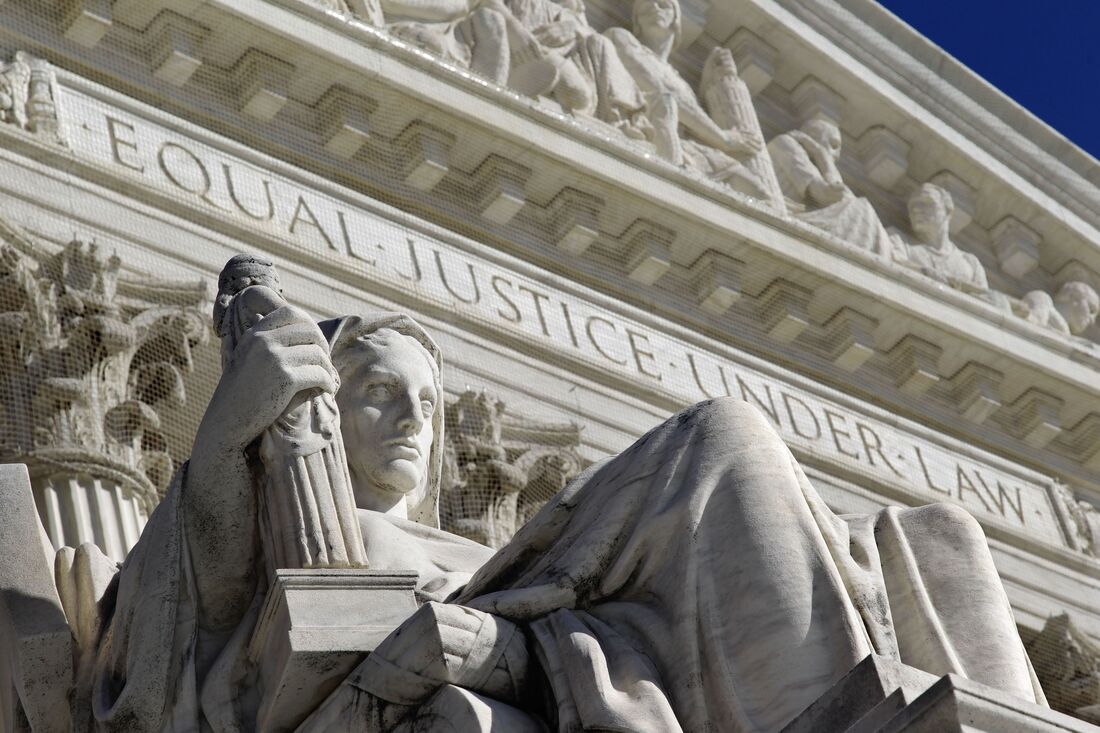

 RSS Feed
RSS Feed